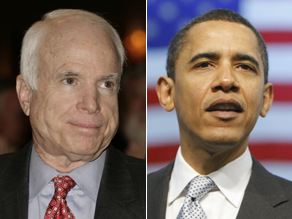 Update (10:45pm): Well that was a fun hour-and-a-half.
Update (10:45pm): Well that was a fun hour-and-a-half.I honestly don’t know what would’ve been a worse option: watching the boring claptrap that was the presidential debate or becoming enraged viewing the Mets game.
The pundits and spinmasters will claim victory for their preferred candidate. (Listening to Rudy Giuliani claim that McCain "won decisively" was good for a laugh, for instance). Yet neither candidate “won” the debate as both men engaged in finger-pointing, repetitiveness, “he-said, she-said” moments, interruptions, and even a bit of maudlin (i.e. the “bracelets” each candidate wears of soldiers fighting in the Middle East).
Speaking of the Middle East, the discussion focused primarily on that region as well as the financial crisis. Latin America was largely shunned except on five minor occasions:
- McCain claiming that he opposed President Bush on Guantanamo Bay. (He never gave details as to what he objected).
- Obama teasing McCain over statements made by him last week seemingly opposing Spain’s Prime Minister. (I know Spain is not Latin America, per se, but I’m including it nevertheless).
- McCain bringing up Obama’s comment that he would meet without preconditions with Hugo Chavez and the Castro regime. (I see the “tease Obama’s primary debate remark on meeting with Hugo Chavez” odds were not far off.)
- McCain’s brief mentioning of “securing the border” during his closing statement.
- Obama’s brief mentioning of the Bush administration ignoring regions around the world like Latin America. (You won if you bet on Obama critiquing the “Bush administration for “ignoring” Latin America.”!)
Did you see the debate? What did you think of it?
Original post: There’s about an hour to go before the first presidential debate between John McCain and Barack Obama. We won’t be liveblogging it but our good friends at Vivirlatino will so please go there and voice your opinion.
Tonight’s forum is supposed to focus on foreign policy and national security though both men will probably discuss the financial crisis. Hopefully they’ll touch on topics affecting the Americas but what are the odds that some issues get more attention than others?
Odds that Obama will:
- Criticize the Bush administration for “ignoring” Latin America – 2/1
- Use immigration to differentiate “Senator” McCain from “candidate” McCain – 5/1
- Argue that travel restrictions against Americans travelling to Cuba should be dropped – 7/1
- Praise Bill Richardson – 13/1
- Announce that he will soon take a trip to Latin America – 25/1
- Tease Obama’s primary debate remark on meeting with Hugo Chavez – Even
- Argue in favor of free trade agreements with countries like Peru – 3/1
- Make a disparaging remark about Raul Castro – 6/1
- Connect the “war on drugs” with the “war on terror” – 10/1
- Mention Sarah Palin’s Tuesday meeting with Colombia’s president – 20/1
- Mention regional leaders aside from the presidents of Mexico, Venezuela, and Cuba – 8/1
- Ignore Latin America altogether – 12/1
- Speak more than three words of Spanish – 50/1
Image- CNN
Sources- Vivirlatino

















